Interviews 1992 (Part One)
...The year began in New York for Fangoria's Weekend of Horrors - with some serious signing sessions and his endorsement of the birth of The Breed fan club. But this really was to be the year of short stories and children's works, with Everville (for children) still in the offing and the publication of The Thief of Always breaking yet more boundaries in Barker's published repertoire. Not content with this, On Amen's Shore - running tangentially from the Books of the Art - was published in the American Demons & Deviants, whilst Halloween saw Hermione & the Moon appear unannounced in the NY Times. Apparently the American public were too squeamish (who were they trying to kid...?) to cope with the original title - The Departed - under which the same story appeared the following day in the UK press. On the film front, Candyman was weaving its way through post-production - with far fewer headaches than Hellraiser III ...
Bride Of Weekend Of Horrors
Talk by Barker at the Fangoria Weekend of Horrors convention, New
York, 1992
"I've said, again from this platform, that I think the distinctions between horror and fantasy and science fiction basically don't make much sense. You see, I think 'Alien' is every bit a horror movie as it is a science fiction movie; it doesn't make sense to make these differentiations. And the only people who do it are studios - film studios - and publishers. And they do it because they like to divide us all up. And they like to divide us - they say, 'OK, these guys only like science fiction - we'll put a spaceship on the cover of this book. And these guys only like sword and sorcery, so we'll have a slave-girl falling out of her brassiere, with a guy with too many muscles and not enough dick on the other side, and that'll be sword and sorcery. And in the middle we'll have books with black covers and a name in silver and a little bit of blood and that'll be the horror guys.' Right. Now this isn't the way our imaginations work - our imginations are much more interesting than that. The distinctions are much more blurred, and so I'm trying very much to fight that - to fight those distinctions, and sometimes it works and sometimes it doesn't. In Great And Secret Show it seemed to work in the sense that a lot of audiences who had liked the fantasy stuff in Weaveworld liked it, and a lot of people who liked the horror stuff also like it, so in Imajica I'm trying the same kind of thing."
Interview
By Ian Spelling, conducted at the Fangoria Weekend of Horrors
convention, New York, 1992 and included on the Bride Of Weekend Of
Horrors video.
"I think I do something which is very strange - I think I write very strange and actually very personal fiction and I'm delighted to find there are as many people as there are who are moved or intrigued by that. But I'm also intrigued, in my own way, by the kind of people who like my material. It's a very eclectic bunch of people at signings and conventions who I meet; good people, healthy people, people who like their imaginations, they are at peace with their imaginations. That seems to me to... that's been something of a revelation to me - to find that little old ladies in the mid-West also read my fiction with 18 year-olds in the Bronx, and that's a surprise to me, and a pleasure to me. It's just now a case of keeping spreading. Y'know, I want to make sure that this weird, offbeat, subversive kind of fiction is also read in the White House. That's very important to me."
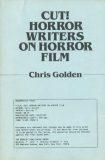
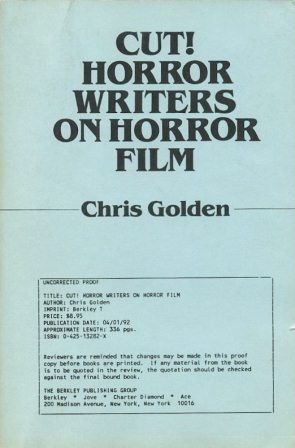
Other Shelves, Other Shadows: A Conversation
By Peter Atkins, in Cut! Horror Writers On Horror Film, edited by Christopher Golden, 1992
"There's a certain level at which horror movies toy with you - I've always said that stories are good traps; they trap you into going into a place physically where otherwise you wouldn't go. It's true of horror stories, it's true of erotic stories. They take you somewhere and you look around and say, "here I am. Whoever would have thought it," you know? And when you do that, you are a little renewed by that experience."
Candyman
Liner notes on the Candyman laserdisc release, 1992
"As a kid, I was told a lot of these stories and they were represented to me as the truth. That's the point about urban legends. They are told to you as something that happened to a friend - that's a very important element to their veracity."
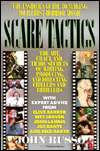
Interview
By John Russo, Scare Tactics, Dell Publishing, 1992
"I have a very strong sense of the world as haunted, and it's not just we human beings who are doing the haunting. My great hero is William Blake, the English poet, mystic and painter. I beieve, as he did, that our imaginings are evolutionary tools (though he wouldn't have used that vocabulary) which we are not even beginning to use fully because we don't quite know what to do with them yet. But they have the potential of helping us see how the cosmos works."
Clive Barker
By Stanley Wiater, Dark Visions, 1992
"For anyone who wants to be a writer, I simply say 'to thy own self be
true'. The major gift that anyone has to give is not a technical gift,
but the gift of their own personal vision. We all know authors who are
not great stylists, but whose vision is compulsive reading. And we also
know great prose stylists who we fall asleep in front of. I've always
told young writers to find that part of yourself that is uniquely you -
find those visions which everyone else has said you should have nothing
to do with, that forbidden part, and write them. Tell the world about
the dark stuff, and do it without embarrassment.
"You've got to want the process of writing more than the achievement.
The pleasure has got to be in the business of the writing, not the
business of the publishing. If you spend the six months of writing a
novel thinking about what it's going to look like on the bookshelves,
you're not doing it right.
"A lot of fledgling writers that I've spoken to, if there's one pitfall
they weren't aware of, is that the writing life was great - except for
the bit about actually doing the writing. They loved the idea of being
published, they loved the idea of going on TV talk shows, but if they
could just get over this fucking business of actually doing the writing;
if they could just get that bit over...!"
The Art Of Horror
By Christopher Holland, video documentary The Art of Horror, 1992
"I am telling my life every time I write a page. My fiction is my confession. Everything that was ever important in my life is written. I'm putting it down. That's what I do. And the more absurd and ridiculous and rococo and baroque the imaginings, the closer it is to me."
Boundless Imajination
By WC Stroby, (i) Fangoria, No 109, January 1992 (ii) Bloody Best of Fangoria, No 11, July 1992 (iii) Horror Zone, No 1, August 1992 (iv) Fangoria's Best Horror Films, Crescent Books, 1994 (Note : interview took place in August 1991)
"Doing a book this scale is as much a dive into a pool of
your own subconscious desires and obsessions as anything.
I, having only recently surfaced from that book, am only
just beginning to get a sense of what it contains from
people who are coming back to me and saying, "You know,
I found this" or "I found that". So maybe in 10 years'
time I can say, "Ah, that's what I was up to." But at
the moment, the book was an attempt to reconfigure a
piece of mythology. With Weaveworld, the mythology was
that of Never-Never Land, how we relate to the idea of a
lost world - the place of innocence which we remember
from fairy tales - and what might happen if that place
came back into our lives as adults. In Imajica, the
subject is the largest myth that the Western world
deals with - the Christ story. That means a lot to me
and I wanted to investigate it for new meaning, new
significance. The bad experiences of Nightbreed drove
me back into the arms of the written word with more
fervour for it than ever before. And if Imajica
sounds like a cry from the heart - that this is a
world which is entirely mine, nobody can tread on it -
it's because of that very fact."
Dream Weaver
By Dave Dickson, Rock Power, No 8, January 1992
"I think it's only the monstrous man who is afraid of woman, but I
think there's a monstrous man in every man. I think the little part of
us that wants to just beat down the world is terrified of this other
sex that we occupy the planet with, that has a completely different agenda.
"I really like getting in amongst that stuff. I really like addressing
those nonsenses and it seems to me that the fantastique has always been
great at doing that. The fantastique plugs into that subconscious
constantly and so many of these things just rise out of that. In other
words, we don't call people on the symbolic value of what they're doing.
There isn't enough finger pointing. There needs to be more people
saying, 'I know what you're really talking about.'
"And I think finger pointing is needed and fantasy - and this is always
the argument I've made about this kind of material - is confrontational.
You can tell truths about things; it isn't an escape from reality, it's
an addressing of the deeper reality. It shouldn't be the simple
dichotomies of good and evil; it should be more."
An Interview With Clive Barker
By Robert Errera, Hecate's Cauldron, Vol 1, Issue 3, 1992 (note - interview took place 4 January 1992)
"I never discuss [ideas]. I don't even discuss ideas with editors if I can help it. I told my publishers Imajica would be a long novel about a person who fakes paintings, who is in love with a woman who is being followed by a supernatural assassin. They said go ahead and do it based on that summary. But that summary of Imajica all takes place within the first 25 pages of the book. When I came back to them with the final draft they said, 'All this about a forgery artist?' I said, 'Well, some of it is.' So, anyway, I'm pretty secretive about stuff I haven't written yet. I don't want to share it."
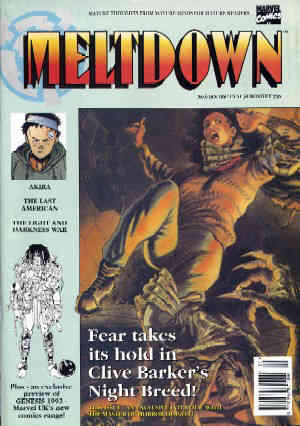
Clive And Dangerous
By Dave Hughes, Meltdown, No. 6, January 1992
"[With the Hellraiser comicbooks] there were too many stories about people who got boxes, opened boxes and were taken to Hell. The answer seemed to be to come up with a counter-mythology that would allow people to be saved from Hell. Suppose there were forces that were dedicated to the undoing of what the Cenobites do... It would be a force for release and redemption which would be the equal of Leviathan, with foot-soldiers that would have the power to enter Hell and steal back the damned... 'Mortemamme' is her name. Basically, 'the dead mother' or, if you prefer, 'the mother of death'. She was created with three other people who I must mention: Fred Vicarel, Anna Miller and Malcolm Smith. Mortemamme has her 'Harrowers', the Harrowers of Hell, which recalls an old Christian image - Christ's harrowing of Hell after his resurrection. And without giving too much away, the Harrowers are empowered to claim the dead, which is a rather tricky business."
Dream Weaver Clive Barker
By Jim Provenzano, The Advocate, 28 January 1992
"I'm determined to write populist fiction. I want books that will seduce people into ways of
thinking that they weren't capable of having. It's not of interest for me to write for
people who already agree with me. I want people to find themselves persuaded in ways of thinking
about themselves, their sexuality, maybe even their theologies. For me, art has got to be a tool.
It's got to be working hard to undo the damage. The only way I can feel validated is to feel as
though I am using the gifts I have to change people...
"In Imajica, the Tabula Rasa are businesspeople. They're the villains of the late 20th century.
Yet the media constantly characterise sexual radicals, people who are a little out of step, as the
villains. My desire to denigrate the status quo, to put a different kind of focus on the strange,
is out of step with the conventions of the genre in which I work. My desire is also out of step
with the way that our culture looks at, say, the Bible or homosexuality, which is by and large
absent from fantastic fiction or, when it's there, is presented as something slightly risque.
Clem and Taylor are presented as two people who happen to be part of this story."
Connie Martinson Talks Books
By Connie Martinson,
[2 February 1992 - original broadcast date unknown] (note - full video available via Claremont Colleges Digital Library http://ccdl.libraries.claremont.edu/cdm/singleitem/collection/cmt/id/820)
"The whole idea that there's another Spring, that we are divided but we can be reunited - not just with our loved ones, not just with the dead, not just with our own past but with God, the whole idea that we have separated ourselves from revelation, from the possibility of understanding ourselves fully and that that reconciliation is just 'that' far away - always. Just that far. That notion excites us in our hearts...
"Our capacity, I believe, to understand the world more fully and more lovingly is so close to us and within our grasp more often than we ever know: when we fall in love we sense that all things are possible; when we see our children we believe all things are possible; maybe even when we create something, you know, when we make a garden that looks beautiful, maybe when we make a book, we realise that we have a greater capacity to heal and unify than we believe when we get up on a Monday morning and it's raining."
Life After Hellraiser
By Allan Bryce, The Dark Side, No 18, March 1992
"If I can do good work in [the horror genre, then I will continue], yes. Horror is an
under-achiever as a genre, and that disappoints me. It disappoints me when I see the
same old good vs evil dichotomy, dragged out again, book after book. It disappoints me
that Steve has turned in the last Castle Rock novel and it's the same old story of the
devil coming to open a shop and seduce ordinary folks. It seems to me you should always
be pushing at the limits of what you can imagine, not just going back to things you did
before and saying, 'Oh yeah, this will be very commercial...' "
A Pilgrim's Progress Through The Worlds Of The Imajica
By [ ], World Of Fandom, Vol 2 No 15, Spring 1992
"When I actually sat down to write [Imajica], which is my largest book so far, I wanted
to make sure that even the blind critic, who does not get this genre at all, has to look
at this and say, 'I may not like the genre, I may not like Barker's writing, I may not
like the fantastique generally, but I have to concede that there is something going on
in this book besides light entertainment.'
"Yes, there are a whole bunch of things nailed to the door; theological and metaphysical
issues, questions about the way we live our lives in terms of sexual judgements. There
is also a celebration in the way we find ourselves in nature. It is a very optimistic
book. It is about the possibility of heaven, and the possibility of overcoming the dark
side of our nature, to reach something better in ourselves. There is something that is
beyond gender, beyond personality and beyond the trivialities of politics. It seems to
me to be a useful time to talk about these things...
"The sense that I'm coming to new place, if you like, is that I've sort of come out of
the darkness of hiding these larger subjects, and issues, in the shadows. It is time for
me to say that these issues are passions of mine - religion is a passion of mine,
folklore is a passion of mine. I want these things to be explicated. I want to be a world
creator. Up until Imajica, I've been making notes on other worlds. This time, like Gentle, I made a map. In a sense, Gentle's adventure is my adventure. I've come back from the worlds with a map and the map is the book that is in the hands of the reader."

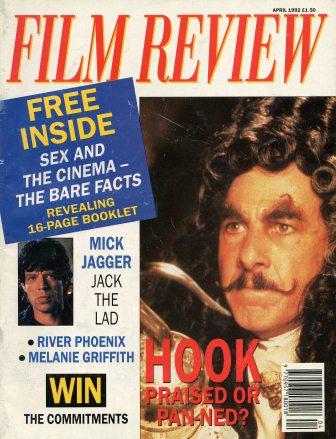
Film Review, April 1992
Hellfire And Location
By Alan Jones,
Film Review, April 1992
[Re: not being involved with Hellraiser 3] "All monsters totter off into the night on their own at some stage. Now it's happened to one of mine.
"Quite honestly, I'm not too concerned. The script is spicy, has superb thrills, and goes like a locomotive. It recalls the original's black perversity - except written on a more extensive, intriguing canvas.
"Peter [Atkins]'s grasp on what makes the myth work is very strong, and I really have no terrible cause for complaint."
Straight To Hell
By Mark Voger, report on Fangoria's New York Weekend of Horrors 1992, Fangoria, No 112, May 1992
"I'm not someone who reads over my own stuff and says, God, what deathless prose - eat your heart out Stephen King'."
A Living 'Hellraiser'
By Cody Goodfellow, (i) The Daily Bruin, 7 May 1992 (ii) Lost Souls, May 2000
"You can turn on MTV and at 4:00 in the afternoon, there are images that our parents would never have been exposed to until their wedding night. Those images permeate our culture. They permeate the way we sell cars, the way cigarettes are sold to us, and we have to deal with that constantly, and it can twist us out of true."
Barker's 'Primal' Is Miramax's First Dimension
By Jeffrey Jolson-Colburn, Hollywood Reporter, 12 May 1992
"I have really enjoyed my association with Miramax and look forward to continuing it with Primal as well as bringing the new film label a lot of new ideas."
Fangoria Weekend Of Horrors, Los Angeles
Transcript of talk at Fangoria's Los Angeles Weekend of Horrors 16/17 May 1992,
presented in Coenobium No 7, 1992 as 'Talking With Christians (And Other Yellow, Hairy, Twelve-Legged Things)'
"I don't want to get too serious about this, but I think it is valuable
to understand that we as a group here, constitute a beleagured and
besieged minority. That is, we have imaginations in a culture that is
increasingly being drained of imagination. You have to cling to the
imagination in you, and all I'm saying is something you know
already. But we're all under siege, we're under siege by conventional
minds all the time, from dead minds, from people who don't understand
the imaginative process, who don't care about imagination. Well,
fuck 'em! You know what, the passion for the weird, and the passion
for the strange, and the outlandish, and the imaginative is [great],
but let us not lose sight of the possibility of changing someone
else's mind. In other words, I always want to talk to a Christian,
because I want the Christian to understand that I get his or her
mythology, and that it's part of my mythology.
"Running away from them and shunning them completely and just thinking
they're deadheads and deserve to go to rot is not enough, because they
won't go to rot. What they will do is what they've always been
doing - gain more and more political power. And they will change our
culture and they will fuck our culture and they will destroy all the
good things of our culture because they are bland, empty-headed people.
And yet, somehow or another, get to the little spot, get to the weird
bone in them. See what I'm saying? It's important to get to the weird
bone and persuade them, say, 'Hey. Do you remember when you were five
and you thought you could fly? Or when you were five and the idea of
being a vampire was the neatest thing in the world? Go back to the
five-year-old and value the five-year-old again, just for a moment.
Be inspired by the five-year-old that's still in you, buried somewhere
behind your three piece suit and your crucifix. Get to that part in
you and touch that part every day.' And, you know, it won't always
work - it seldom does - but I think if you can do something in that
direction, at least there's some sense in holding on to the good parts
of our culture instead of letting it all go."
Barker's Primal Fears
By John Wooley, Fangoria, No 113, June 1992
"You have this wonderful thing with comics. As long as the artist can
put it on the page, it can be laid before the reader. You don't have
the ticking clock [as in movies], which says, 'We can't possible get
this shot.' Or, worse, the ticking accountant who says, 'I'm going to
explode if you spend another dollar.' Special effects are cheap in a
comic, and the imagination you can lend them is expanded as a consequence."
Straight To Hell
By Philip Nutman, Fangoria, No 113, June 1992
"I've seen a 20 minute show reel [of Hellraiser III] and some of the images are very striking. The Pinhead footage is most impressive and it all looks quite promising, but obviously I can't evaluate how the narrative works because I haven't seen a rough cut yet. As for the MPAA, who can say? They're so unpredictable that it's impossible to pinpoint what could be a problem. What seems to offend them one year isn't the case the next... But since they've been tough on the previous Hellraiser films, I expect they will give Hellraiser III a hard time."
Rawhead Rex - The Creator
By Michael Brown, Dread, No 6, 1992
One of the weird things is that Rawhead Rex seems to have
caught people's attention. When we were doing the
Nightbreed stuff for Epic Comics, I said to Dan
Chichester, 'Wouldn't it be great to bring in a monster
from the 'Books of Blood'. Let's bring in Rawhead
Rex'...We got special permission from Eclipse to have
Rawhead Rex in the Nightbreed stories. Dan did great
stuff. I like that arc of stories. Rawhead Rex's balls
being blown off for making that girl pregnant, all that
stuff. It's kind of cool. Dan always goes the distance
with the stuff."
The Dreaded News
News by Michael Brown, Dread, No 6, 1992
"The guy behind Stephen King's 'It', who is now heading up the drama section of ABC, has commissioned teleplays for what would be a two hour Halloween package of 'The Inhuman Condition' and 'Revelations', which will be framed by me as a sort of host. I think it will be fun. Both stories can be put on TV - they're not really visceral stories. They can be put on TV without softening them overly much. We're working with a man called Bill Link, who is the man behind 'Columbo'. I think it will work. I'm really excited about that prospect."
Click here for Interviews 1992 (Part Two)...




